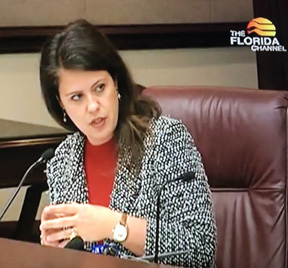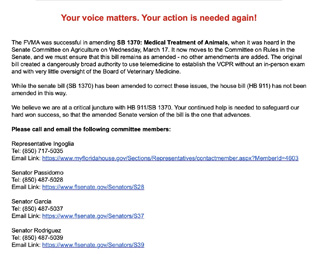!This story has an important update
Ana Maria Rodriguez

Screenshot of The Florida Channel
State Sen. Ana Maria Rodriguez, sponsor of SB 1370, noted during testimony March 17 before the Senate Agriculture Committee that amended language in the bill "has been agreed to by all stakeholders." The committee passed SB 1370, sending it to the Senate Committee on Rules for further consideration.
What do a California entrepreneur, high-powered lobbyists, and a company incorporated just weeks ago in Delaware have to do with a legislative push to ease veterinary telemedicine restrictions in Florida?
Veterinarians in the state are asking.
Florida has become ground zero in a deregulation battle over whether to allow telemedicine providers carte blanche access to companion animals by removing restrictions that require practitioners to examine patients in person in order to establish a veterinary-client-patient-relationship (VCPR), a prerequisite of remote care.
Pushing for deregulation is a telemedicine company called Dutch Pet that records show was incorporated Feb. 16 in Delaware. The company has hired the lobbying firm Corcoran Partners to propel bills in the Florida House and Senate — SB 1370 and HB 911 — through the Legislature before the session ends April 30.
The Senate bill passed both the Regulated Industries Committee and Agriculture Committee and is pending in the Rules Committee. The House bill passed the Regulatory Reform Subcommittee and is now in the Commerce Committee.
The pressure has stunned the Florida Veterinary Medical Association, which for years had tried to cement telemedicine parameters through the Legislature without success. Now the group is on the defensive, sending emails in rapid succession to FVMA members, urging that they contact their representatives to slow the initiatives that, if enacted, could deregulate veterinary telemedicine in Florida by July 1.
In addition to relaxing the requirements to practice veterinary telemedicine, the House and Senate bills would allow non-veterinarians in Florida to administer rabies vaccines with a veterinarian's indirect supervision. Right now, only veterinarians in the state can vaccinate animals for rabies.
"How did these bills even get drawn up? Good question; they didn't contact veterinarians in the state about this," said Dr. Richard Sutliff, a private practitioner and president of the Florida Veterinary Medical Association. "It's a mystery, because I've never seen a bill move this fast. We've never heard of Dutch Pet and we don't know much about it."
Dutch Pet was founded by entrepreneur Joe Spector and backed by Trust Ventures, a venture capitalist firm whose director of legal and policy, Dan Epstein, worked in the Trump White House as a senior associate counsel and special assistant to the president.
Spector, who describes himself on his Twitter page as a "Refugee from former Soviet Union (Uzbekistan)" now living in San Francisco, co-founded the wellness company Hims & Hers Health Inc., a direct-to-consumer business that provides a telemedicine platform for users seeking Viagra and other medications.
The lobbying firm they hired — Corcoran Partners — is run by Michael Corcoran, brother of Rep. Richard Corcoran, former speaker of the Florida House who now serves as the state's education commissioner.
"I have seen the benefits telemedicine provides in terms of access and affordability to address health concerns that would otherwise go untreated," Spector said by email in a statement to VIN News.
Florida is not the first place to grapple with how to treat veterinary telemedicine. Whether and how to relax the rules is a topic raised in jurisdictions across the country and beyond, as veterinary care evolves beyond brick-and-mortar practices to incorporate electronic communications. To date, the prevailing belief has been that telemedicine is a useful tool, but because animal patients can't tell their doctors how they feel, an in-person physical examination is a required foundation for future care.
That perspective is being challenged as jurisdictions, responding to the COVID-19 pandemic, have temporarily relaxed rules to allow for treatment and prescribing of medications without a physical examination. Some telemedicine providers, along with animal advocates looking for ways to bring veterinary care to poor and/or underserved populations, would like it to stay that way.
Florida, however, did not suspend the state's VCPR requirements under a pandemic-related emergency order permitting veterinary telemedicine. In testimony on March 17 before the Florida Senate Agriculture Committee, Tallahassee practice owner Dr. Julie Moodoyan told lawmakers why a hands-on exam is so important.
"This is not equivalent to human medicine; our patients can't speak for themselves," she said. "They can't tell us when it hurts; they can't tell us when they're nauseated; they can't tell us when they're in pain. And oftentimes, owners, even though they're very well-meaning, they don't have the ability to understand the cues and the physical manifestation of those problems."
For example, she continued: "An owner cannot tell the difference between an animal that is straining to defecate and when it's straining to urinate. I can tell within five minutes of putting my hands on that animal that it is in a life-threatening situation, and it needs to be hospitalized and go to surgery immediately. This is not something I can do without all of my senses."
FVMA Alert 320

The Florida Veterinary Medical Association is encouraging practitioners in the state to lobby lawmakers on legislation that seeks to lift veterinary telemedicine restrictions.
Click here for a larger view
As a result of lobbying by the state's practitioners, the Senate bill has been amended to restrict telemedicine without an in-person VCPR to cases involving emergencies, nutrition, training, dermatological conditions and anxiety, reflecting a compromise between organized veterinary medicine and deregulation proponents. The House bill, however, still allows veterinary telemedicine providers to establish a VCPR remotely in all instances, plus, in certain cases, to prescribe drugs including opioids. No hands-on physical exam required.
"The FVMA's position on this is really straightforward," Sutliff said. "We have all been using the tools of telemedicine for years. We just don't believe it's best for initial diagnosis, and we absolutely don't think it should be used to establish a veterinary-client-patient relationship."
The American Society for the Prevention of Cruelty to Animals disagrees. In testimony to the Senate Agriculture Committee, the ASPCA's senior director of state legislation, Jennifer Hobgood, called expanded access to veterinary medicine "vital."
"Current Florida law forbids veterinarians from using telemedicine unless they've seen the patient within 12 months, and this is an outdated and somewhat arbitrary and often unnecessary regulatory hurdle that prevents veterinarians and consumers from accessing and fully utilizing telemedicine technology," she said. "... Where we should be opening a service and embracing innovation, we have in fact an unnecessary regulatory wall blocking access to veterinary telemedicine that is safe and sound."
Spector, head of Dutch Pet, said in his emailed statement that the company wants veterinarians to have the flexibility to determine how to establish a VCPR, rather than the relationship being dictated by government:
"From Dutch's perspective, the FVMA's proposal would threaten the legislative purpose of expanding access to veterinary care and clarifying that establishment of a VCPR is a standard of care question within the veterinarian's professional judgment — not something where a veterinarian's professional judgment should be substituted by government regulators."
April 2 update: The American Veterinary Medical Association is urging its members in Florida to contact their lawmakers to oppose the bills. In an email Friday, the national organization said: "After intense negotiations with the Senate Committee on Agriculture, the Florida Veterinary Medical Association was able to amend SB 1370 to minimize the negative impacts of the bill. However, the amended version of SB 1370 still allows use of telemedicine in certain circumstances without an in-person exam to establish the VCPR, so we remain opposed."
April 19 update: The House Commerce Committee passed an new version of HB 911, amended to more closely resemble SB 1370. Opponents of the bill say they were denied access to the committee meeting and could not testify against it. SB 1370 is expected to be heard by the Senate Rules Committee next week.
April 23 update: The House passed HB 911 in a 98-9 vote with 13 absentions. The Senate version, SB 1370, stalled in the Rules Committee, however, there are ways for the bill to bypass the committee process and head directly to the Senate floor for a vote. Florida's legislative session ends April 30.
Correction: HB 911 was previously heard by the House Regulatory Reform Subcommittee and is pending in the House Commerce Committee. This article originally gave an incorrect bill history and status.